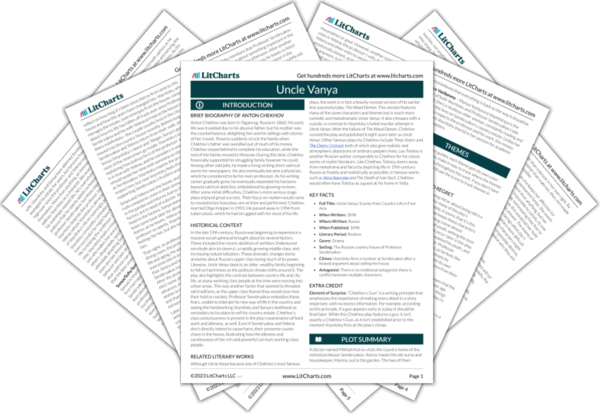The conflict between industry and idleness—a central focus of the play—begins when Professor Serebryakov and Yelena arrive and disrupt Voynitsky’s hardworking household—but it’s the couple’s inaction, not anything they do, that seems to throw the house into chaos. Serebryakov is retired and Yelena doesn’t work, which leaves the two of them to live idly in the house and unintentionally cause problems through their lack of focus or direction. After the couple's idleness “infects” the house and stirs up a confrontation, the couple leaves, and the household can go back to being happy, virtuous, and—most importantly—busy.
But this return to hard work at the end of the play isn’t the neat resolution it first appears to be. In fact, for many characters, keeping busy seems more like a coping mechanism than a source of genuine peace and contentment. Voynitsky is almost too eager to throw himself into his work as soon as his unwanted guests leave—he’d do anything to focus his mind on something other than the spectacle he just made of himself by firing a revolver at Serebryakov following their heated argument. It’s true that hard work brings order to the characters’ lives and idleness can lead them down a dangerous path, but the true danger of idleness might stem from the fact that it leaves people with nothing to distract themselves from their inner thoughts and insecurities. By working hard and believing they can finally rest after death, Voynitsky and Sonya only ever have to think about what’s right in front of them rather than their deeper desires and worries. Their work distracts them from their real underlying problems, but it doesn’t solve any of them. From this perspective, then, it’s plausible that the real reason that Sonya and the professor’s presence at the estate bothers the other characters isn’t because they believe the couple’s idleness is sinful—at least, not entirely; rather, Sonya and Serebryakov’s idle, miserable existence lays bare the existential suffering that likely would consume each character if they hadn’t so many daily tasks with which to distract themselves. In this way, the play’s praise of hard work is an ironic commentary on the limits of hard work and diligence, pointing out how working can only numb the pain and meaninglessness of everyday life—it cannot, however, alleviate suffering or bring meaning to one’s life.
Industry vs. Idleness ThemeTracker

Industry vs. Idleness Quotes in Uncle Vanya
I sat down, closed my eyes — like this — and thought: will those who will be living a hundred, two hundred years from now, those for whom we are now laying down the road to the future, will they remember us in their prayers? Nyanya, they won’t!
…And perhaps this really is just craziness, but when I go past the peasant’s woods, which I saved from destruction, or when I hear the hum of my young trees, which I planted with my own hands, I know the climate is a little in my control and that if in a thousand years man is happy, the responsibility for that will in a small way be mine. When I plant a birch and then watch it come into leaf and sway in the wind, my spirit fills with pride…
I work all my life for learning, and I’m used to my study, the lecture hall, the colleagues I esteem — and then, I end up for no good reason in this tomb, see fools here every day, listen to worthless conversations… I want to live, I like success, I like fame, making a noise, and here it’s like being in exile. To pine every minute for the past, to watch the success of others, to be afraid of death… I can’t! I haven’t the strength! And they won’t even excuse me my age here!
She is beautiful, no question about that, but… she just eats, sleeps, walks, enchants us all with her beauty — and that’s all. She has no responsibilities, others work for her… It’s true, isn’t it? And an idle life can’t be a virtuous one.
You’re bored, you can’t find a role for yourself, and boredom and inactivity are infectious. Look: Uncle Vanya does nothing and just follows you round like a shadow, I’ve left my work and come running to you to talk. I’ve got lazy, I can’t do it! Doctor Mikhail Lvovich used to visit us very seldom, once a month, it was difficult to persuade him, but now he drives over here every day, he’s left his woods and his practice. You must be a sorceress.
I think you are a good, sincere person but there’s also something strange in your whole being. You came here with your husband and everyone who was busily working here and creating something had to drop what they were doing and devote the whole summer to looking after your husband’s gout and you yourself. Both of you — he and you — infected all of us with your idleness… I’m joking of course, but still… it’s strange, and I’m convinced that if you had stayed, the devastation would have been enormous.
…But let an old man include just one observation in his farewell greetings: my friends, one must do a job of work! One must do a job of work!
We shall live, Uncle Vanya. We shall live out many, many days and long evenings; we shall patiently bear the trials fate sends us; we shall labour for others both now and in our old age, knowing no rest, and when our time comes, we shall meekly die, and there beyond the grave we shall say that we suffered, that we wept, that we were sorrowful, and God will have pity on us, and you and I, dear Uncle, shall see a life that is bright and beautiful and full of grace, we shall rejoice and look back on our present woes with tenderness, with a smile — and we shall rest.











